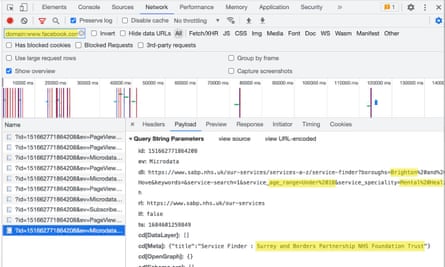NHS information breach: trusts shared client information with Facebook without authorization
NHS trusts are sharing intimate information about clients’ medical conditions, consultations and treatments with Facebook without permission and in spite of appealing never ever to do so.
An Observer examination has actually discovered a concealed tracking tool in the sites of 20 NHS trusts which has actually for years gathered searching details and shared it with the tech giant in a significant breach of personal privacy.
The information consists of granular information of pages seen, buttons clicked and keywords browsed. It is matched to the user’s IP address– an identifier connected to a private or family– and in most cases information of their Facebook account.
Details drawn out by Meta Pixel can be utilized by Facebook’s moms and dad business, Meta, for its own organization functions– consisting of enhancing its targeted marketing services.
Records of details sent out to the company by NHS sites expose it consists of information which– when connected to a private– might expose individual medical information.
It was gathered from clients who went to numerous NHS websites about HIV, self-harm, gender identity services, sexual health, cancer, kids’s treatment and more.
It likewise consists of information of when web users clicked buttons to reserve a visit, order a repeat prescription, demand a recommendation or to finish an online counselling course. Countless clients are possibly impacted.
This weekend, 17 of the 20 NHS trusts that were utilizing Meta Pixel validated they had actually pulled the tracking tool from their sites.
8 released apologies to clients. Several trusts stated they had actually initially set up the tracking pixels to keep an eye on recruitment or charity projects and were not mindful that they were sending out client information to Facebook. The Information Commissioner’s Office (ICO) is examining.
The Observer can expose:
In one case, Buckinghamshire Healthcare NHS trust shared when a user saw a client handbook for HIV medication. The name of the drug and the NHS trust were sent out to the business together with the user’s IP address and information of their Facebook user ID.
Alder Hey Children’s rely on Liverpool, sent out Facebook information when users went to web pages for sexual advancement issues, crisis psychological health services and consuming conditions. It likewise shared information when users clicked to purchase repeat prescriptions.
The Tavistock and Portman NHS structure rely on London shared information with Facebook when users clicked the info page for its gender identity service, which specialises in dealing with kids who have gender dysphoria. Information was likewise shared when users saw the website for the Portman Clinic, which “provides professional aid with troubling sexual behaviours”, and clicked for information on how to be described the service.
Surrey and Borders Partnership NHS trust shared information with Facebook when a client clicked buttons suggesting they were under 18, resided in Brighton and wished to gain access to psychological health services.
Other NHS trusts sent out detailed invoices to Facebook when users accessed pages for consultation reservations or finished online self-help courses. Barts Health NHS trust, which serves a population of 2.5 million in London, shared information with Facebook when a user clicked to “cancel or alter a consultation” or included a check out to a specific health center to their schedule.
The Royal Marsden, an expert cancer centre, sent out information on clients asking for recommendations, seeing info about personal care and searching pages for specific cancer types.

The findings have actually triggered alarm amongst personal privacy professionals who stated they showed extensive prospective breaches of information security and client privacy that were “entirely inappropriate”.
Details sent out to the business is most likely to consist of unique classification health information, which has additional defense in law and is specified as details “about a person’s past, existing or future health status”, consisting of medical conditions, tests and treatment and “any associated information which exposes anything about the state of somebody’s health”. Utilizing or sharing it without specific authorization or another legal basis is prohibited.
When the information reaches Facebook’s servers, it is not possible to track precisely how it is utilized. The business states it restricts organisations from sending it delicate health details and has filters to weed such information out when it is gotten by error.
Teacher David Leslie, director of principles at the Alan Turing Institute, stated the transfer of information to 3rd parties by the NHS ran the risk of harming the “fragile relationship of trust” with clients. “Our sensible expectation when we’re accessing an NHS site is that our information will not be drawn out and shown third-party industrial entities that might [use it] for targeting advertisements or connecting our individualities to health conditions,” he stated.
Wolfie Christl, an information personal privacy professional who has actually examined the advertisement tech market, stated: “This need to have been dropped in regulators a long period of time earlier. It is reckless, even irresponsible, and it needs to stop.”
He implicated Meta of doing insufficient to monitor what info it was being sent out. “Meta states we do not allow particular kinds of information being sent out to us however they have not invested enough on resources to examine this,” Christl stated.
The details sent out to Facebook throughout a test by the Observer was moved immediately upon filling a site– prior to the user had actually chosen to “accept” or “decrease” cookies– and without specific permission. Just 3 of the 20 trusts pointed out Facebook or Meta in their personal privacy policies at all. Numerous of the trusts had actually formerly assured clients that their info would not be shared or utilized for marketing.
Jointly, the 20 NHS trusts discovered utilizing the tracking tool serve a population of more than 22 million individuals in England, extending from Devon to the Pennines. Some had actually been utilizing it for a number of years.

Among the trusts that pulled the tracking tool this weekend, Buckinghamshire Healthcare NHS trust, had actually formerly stated in its personal privacy policy that “private individual info about your health and care … would never ever be utilized for marketing functions without your specific approval”.
In a declaration, the trust apologised to clients and stated the Meta Pixel had actually been active on its site in mistake. “It was set up in relation to a recruitment project, and we were not conscious that Meta was utilizing this info for marketing functions,” a representative stated. “Immediate action has actually been required to eliminate it.”
Alder Hey stated it asked visitors to its site for consent to utilize cookies and stated clients’ names and addresses had actually not been shared. It has actually eliminated the tracking tool.
The Royal Marsden stated it routinely evaluated its personal privacy policies however did not state whether it prepared to eliminate the pixel. Barts stated it was getting rid of trackers from its site “following the disclosure that they were being utilized to draw out individual info beyond the function for which they were initially set up, which was to determine reactions to recruitment marketing campaign.”
Numerous stated they were uninformed of how information would be utilized and apologised to clients for stopping working to get permission. Aside from the 17 who pulled or are pulling the tool, Hertfordshire Partnership trust and Royal Marsden stated they were examining the problems internally and just the Tavistock and Portman did not react to ask for remark.
The ICO stated it had “kept in mind the findings” and was thinking about the matter. “People deserve to anticipate that organisations will manage their details safely which it will just be utilized for the function they are informed,” a representative stated.
Discoveries about the NHS usage of Meta Pixel follow regulators in the United States released cautions over using tracking tools there. Last summer season, tech site The Markup exposed their usage on the sites of doctor. In December, the Biden administration alerted that utilizing tracking pixels to gather client information without permission was a possible federal law infraction.
A number of leading United States healthcare facilities are presently being taken legal action against by their clients over their usage of the pixels, which are small pieces of code that are undetectable throughout regular surfing.
Meta is likewise dealing with legal action over allegations of intentionally getting delicate health info– consisting of from pages within client websites– and not taking actions to stop it. The complainants declare Meta breached their medical personal privacy by obstructing “separately recognizable health info” from its partner sites and “monetising” it.
Jeffrey Koncius, a partner at Kiesel Law in California and among the lawyers leading the action, stated the information transfer by the NHS sites appeared comparable to what was occurring in the United States. “Imagine if a healthcare facility sent out a letter to Mark Zuckerberg and stated, ‘We desire you to understand that Jeff Koncius is our client,'” he stated. “That’s precisely what’s occurring here. It’s simply taking place digitally.”
The Liberal Democrat health representative Daisy Cooper explained the findings as a “stunning discovery” that raised major concerns about the security of client info. “The NHS should examine how this occurred and how prevalent this supposed information breach is,” she stated.
NHS England stated specific trusts was accountable for guaranteeing they followed information defense laws. “The NHS is checking out this problem and will take more action if required,” a representative stated.
Meta stated it had actually called the trusts to advise them of its policies, which restricted organisations from sending it health information. “We inform marketers on effectively establishing organization tools to avoid this from happening,” the representative stated. They included it was site owner’s obligation to guarantee it adhered to information defense laws and had actually gotten authorization prior to sending out information.
The business did not respond to concerns about the efficiency of its filters developed to weed out “possibly delicate information”, or which kinds of details they would obstruct from medical facility sites– or state why it allowed NHS trusts to send it information at all, provided the high threat it might expose information about the web user’s health.
“Like any innovation, our filters will not have the ability to capture whatever all of the time. We are continuously enhancing our systems to make sure we capture as much as we can,” a representative stated.
The business uses its service tools to marketers, stating they can assist them utilize health-based marketing to “grow your organization”. In one guide, it states information gathered through its service tools can enhance users’ Facebook experience by revealing them advertisements they “may be thinking about”. “You might see advertisements for hotel offers if you go to travel sites,” it describes.
Sam Smith, at medConfidential, an information personal privacy project group, stated it was never ever proper for the tools to be utilized to gather health details. “There’s no advantage to NHS rely on offering this info away. It’s like asking a tobacco business to sponsor a cancer ward,” he stated. “NHS England is tacitly authorizing this by not imposing anything much better.”
Source: NHS information breach: trusts shared client information with Facebook without permission